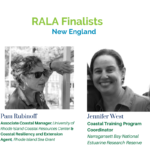2020 New England Regional Adaptation Leadership Award Finalists
ASAP is thrilled to highlight the incredible accomplishments of the 2020 New England Regional Adaptation Leadership Award Finalists. Thank you to our nominators and selection committee members who contributed the content for these highlights. Please join us for the awards ceremony celebrating these finalists and our finalists from the Carolinas live on the ASAP Facebook page at 12:00 p.m. ET on Wednesday, October 28!
- Melissa Ocana
- Jennifer West
- Pam Rubinoff
- Julie Wormser
- Racial Environmental Justice Committee
- Regional Partners and Selection Committee Members
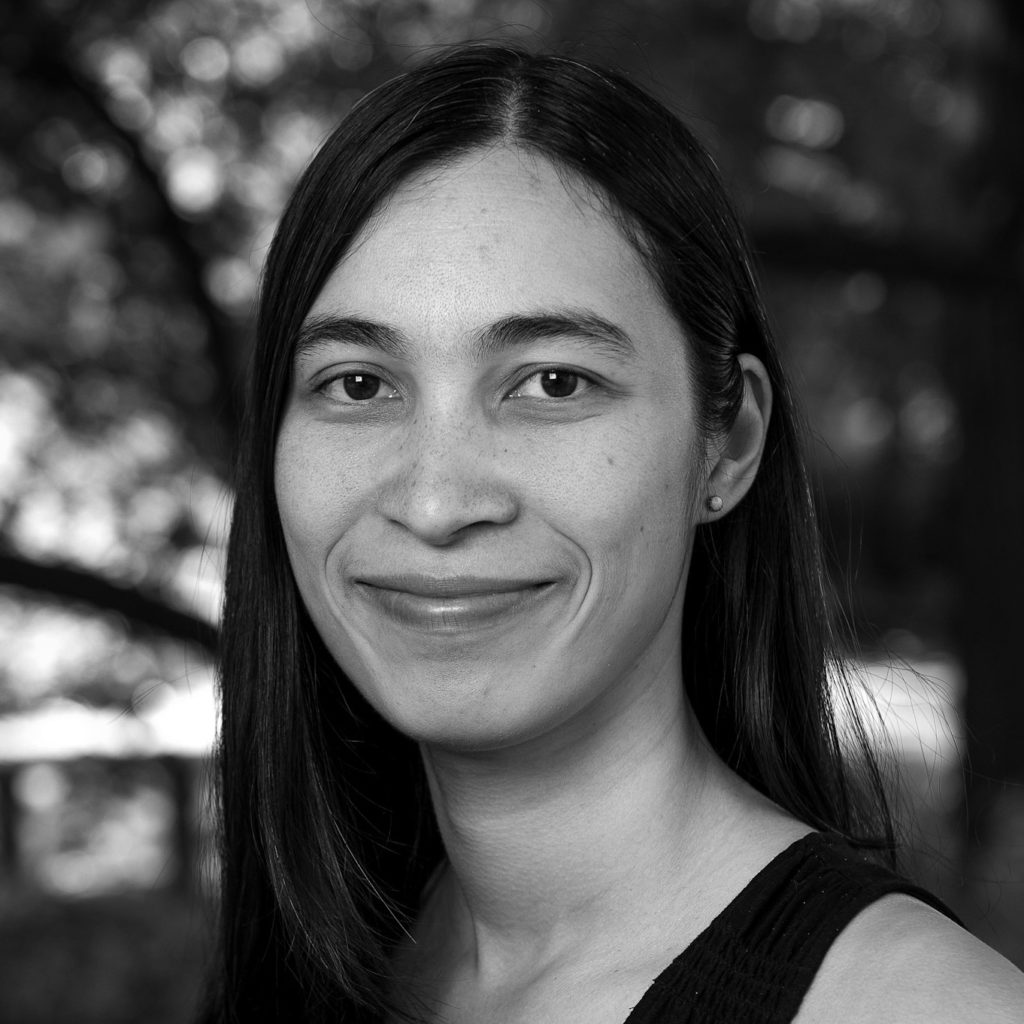
Melissa Ocana
Climate Adaptation Coordinator and Extension Project Manager, University of Massachusetts Amherst
Nominators: Marissa Weiss, Scott Jackson, and Bridget Macdonald
Melissa is using communication and collaboration to advance ecosystem-based adaptation and adaptation networks.
Effective adaptation work requires excellent collaboration and communications skills, and if there is anyone who embodies these characteristics through her practice it’s Melissa Ocana. Melissa not only brings climate adaptation professionals together, she also envisions and co-creates the future of the adaptation field making space for interdisciplinary projects that are both tangible and useful.
In the Massachusetts Ecosystem Climate Adaptation Network (Mass ECAN), Melissa has facilitated a thriving network of climate change adaptation practitioners who work together, share information and coordinate efforts to ensure that species and ecosystems are part of a comprehensive approach to climate change preparations. Her remarkable and tireless ability to nurture a state-wide climate adaptation network has empowered participants to get involved, connect with peers, contribute their expertise, and share their successes and failures. Melissa also leads ASAP’s Network of Networks Member-Led Interest Group, underscoring her passion and skill for using networks to advance the field as a whole.
From her home base at the University of Massachusetts Amherst, Melissa partners with scientists from different disciplines and expertise to create integrated research and extension projects that address climate adaptation and participate in climate adaptation networks at the state, regional and national levels. Recently she has been exploring the nexus between environmental justice issues and ecosystem-based approaches to climate adaptation. Check out Melissa’s accomplishments, where she has imprinted her vision for using effective communication and collaboration to advance adaptation work:
- Co-created the Massachusetts Ecosystem Climate Adaptation Network (MassECAN) community of practice.
- Created and serves as a facilitator for six climate adaptation workgroups focused on: climate change communication, mainstreaming nature-based solutions, slow-the-flow, salt marsh adaptation, forest adaptation, and cold-water stream adaptation.
- Developed the Massachusetts Wildlife Climate Action Tool to provide information to municipalities, landowners, land trusts, and other local conservation organizations on the science of climate change and actions they can take to protect natural resources.
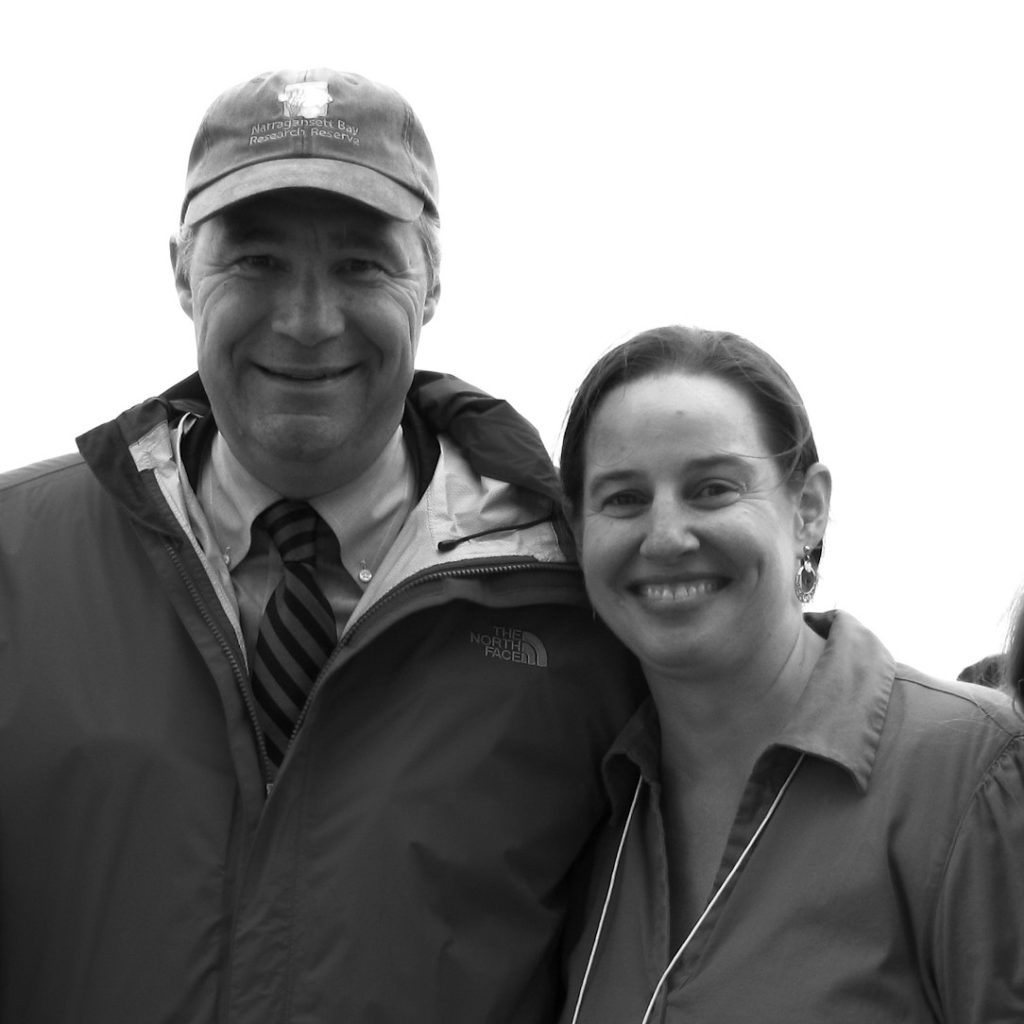
Jennifer West
Coastal Training Program Coordinator, Narragansett Bay National Estuarine Research Reserve, Providence, RI
Nominator: Pete Wiley
Jennifer is strengthening local adaptation by building creative learning and planning spaces.
In her role as Coastal Training Program (CTP) Coordinator at the Narragansett Bay National Estuarine Research Reserve (NERR), Jennifer West fosters innovation, trust, and commitment among the participants in coastal projects across Southern New England and acts as a conduit between the science of estuaries and those who use that information in decision-making and public policy. She works collaboratively with stakeholders to implement adaptation approaches that address multiple challenges for issues including coastal wetland protection and restoration, stormwater management, low impact development, green infrastructure, community resilience, science communication, and stakeholder engagement. Jen is skilled at community engagement, effectively drawing out participant experiences to connect them to the content in the training programs she runs. She has also been successful in incorporating values of justice, equity, inclusion, and diversity into her trainings as key elements. Her critical thinking has greatly advanced Narragansett Bay NERR’s understanding of how to use adaptive management techniques to improve coastal resilience in Rhode Island.
Jen brings a unique blend of intelligence, creativity, and energy into the role which allows her to be a critical player in the CTP sector and in the Narragansett Bay area, and to have a considerable influence in the New England region and across the national system of reserves. Her generosity of energy and ideas, along with a wicked funny sense of humor, make her an indispensable presence for the CTP community and the Reserve system as a whole.
Check out some of Jen’s impressive work, which centers around creating collaborative learning and adaptation planning spaces, connecting local communities to adaptation work, and influencing the thinking of decision makers in Rhode Island:
- Developed the six-part Providing Resilience Education for Planning & Preparedness in Rhode Island (PREP-RI) modules aimed at increasing the decision-making capacity of the state’s local board, commission members, and municipal staff.
- Expertly organized team meetings, ran webinars for end-users, and developed a suite of practical products for a national-scale, first-of-its-kind project to evaluate factors that affect the success of thin-layer sediment placement (TLP) projects to build tidal marsh resilience to sea-level rise.
- Coordinated an innovative climate change adaptation workshop for local officials that utilized role-playing by the participants to encourage a better understanding of the issues.
- Trained decision-makers on how to manage public meetings and gather public input effectively when discussing controversial issues, such as managing for climate change.
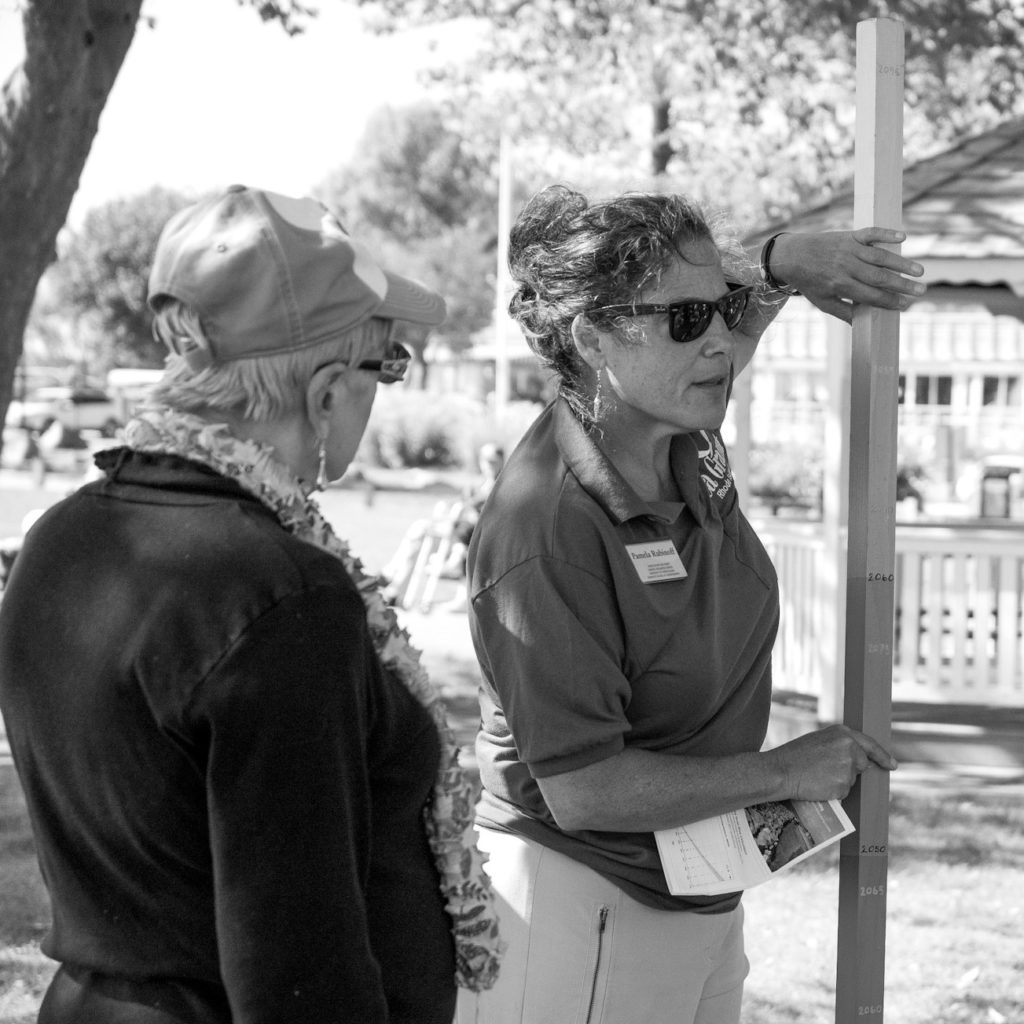
Pam Rubinoff
Associate Coastal Manager, Coastal Resilience, Extension Specialist, Rhode Island Sea Grant
Nominator: Jennifer McCann
Pam fosters cross-sector collaboration to ensure climate adaptation science and planning are accessible to all.
For more than a decade, Pam Rubinoff has helped coastal communities develop and implement science-informed resiliency plans that engage a spectrum of stakeholders and reflect their collaborative visions. She works to ensure that resiliency projects reflect the issues and concerns of multiple stakeholders, make use of the latest and best science, and employ measurable and scalable solutions that are carried out collectively among government, private sector, academic, and community interests.
Her work in coastal community adaptation efforts is highly regarded in Rhode Island because she successfully translates science to stakeholders, works with disparate groups to find consensus and solutions, and earns the trust of her audiences as they build their own confidence in adaptation planning. Pam’s visioning expertise is evidenced in her work with the National Sea Grant network to research the challenges preventing ethnic groups in Rhode Island from participating as fully as possible in public dialogues concerning decisions about coastal and ocean resources, and to develop opportunities to foster engagement of ethnicities, such as the local Latinx population, in these economic, social, and environmental debates.
Pam is one of the University of Rhode Island (URI)’s most trusted and respected resiliency specialists and she is regularly requested to represent the college in media appearances concerning climate change stories. She spearheaded the development and implementation of PREP-RI, a series of online modules that were created at the request of the Rhode Island legislature to provide now-mandated resiliency education to elected officials and volunteer boards at the state and local levels. She worked with the Rhode Island marina industry to develop a manual and a checklist tool to help businesses hone in on practical and affordable options for waterfront protection against strong storms and sea level rise. And she serves as the extension specialist for a Department of Homeland Security effort to test adaption tools locally and recommend optimal tools for national dissemination.
Pam has cultivated a variety of means of reaching coastal communities with palatable, easy-to-understand climate change science. Check out recent events she’s organized for the Common Fence Point community:
- A hurricane presentation by a local meteorologist that couched sobering science in song, humor, and engaging photos
- A social distance scavenger hunt that acknowledged pandemic fears while moving resiliency work forward.
As a result of Pam’s detailed and careful work with the community, the Rhode Island Infrastructure Bank/Municipal Resiliency Program approved grant funds to upgrade the main entrance to the community so it can better withstand flooding caused by weather events and sea-level rise. (Learn more about the Infrastructure Bank in this recording from ASAP’s Co-Creation webinar series.)
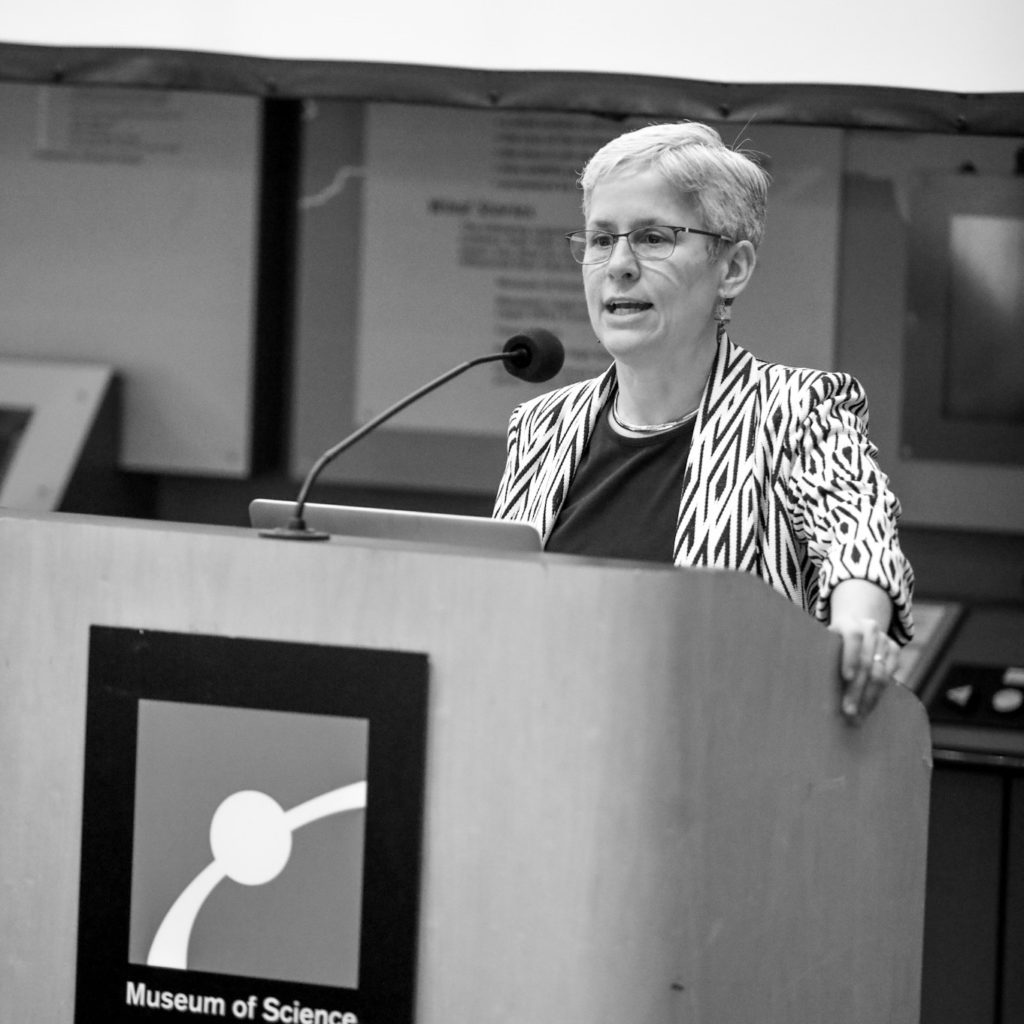
Julie Wormser
Deputy Director, Mystic River Watershed Association
Nominators: Patrick Herron, Rachel Jacobson, and Emily Sullivan
Julie is a forward-thinking leader who is pushing the boundaries of adaptation work and getting tangible results for communities.
Julie Wormser plays a critical role in promoting forward-thinking action on climate resilience and preparedness in Metro Boston. Beginning with her tenure at Boston Harbor Association and continuing with the creation of the Resilient Mystic Collaborative, Julie has been a mainstay of climate resilience and preparedness work in the region.
The Mystic River Watershed Association (MyRWA) work has taken on a whole new level of energy, focus, urgency and reach since Julie Wormser joined the organization two years ago. Julie organized the Resilient Mystic Collaborative (RMC) to address climate impacts that stretch across municipal boundaries to all Mystic River watershed communities. This structure fills a critical void in Massachusetts, which lacks a cohesive governance structure for implementing regional adaptation projects. Julie uses her communications expertise to motivate members and create a regional agenda for climate change adaptation in Greater Boston, such as coordinating municipal staff to urge Massachusetts DEP to update its outdated stormwater handbook. Her detailed understanding of wide-ranging adaptation requirements enables her to organize the watershed communities to collaborate and leverage their respective climate adaptation work to achieve bigger wins together.
Julie also has a proven ability to create the conditions on the ground to move adaptation work forward. She has successfully applied for funding that has totaled more than $2.3 million since 2018, including funds to staff Resilient Mystic Collaborative and Municipal Vulnerability Preparedness (MVP) action grants for nine communities in the Mystic River watershed. Her grantwriting and the funding it enabled has filled critical capacity gaps for municipalities.
Julie’s leadership is enhanced by her humility and curiosity, which brings many different people to important conversations and guides them to collaboratively probe deep problems to make change together.
Learn more about Julie’s accomplishments:
- Founded the Resilient Mystic Collaborative, a 20-community collaborative that has committed to protecting the Mystic Watershed’s people and places from climate-intensified risks. Check out the Boston Globe coverage here.
- Launched the Boston Living with Water Competition – which included 50 teams and 350 competitors from eight countries – to raise the visibility of sea-level rise and the scale of adaptation required.
Providence Racial and Environmental Justice Committee
Frontline community members in Providence, RI
Nominator: Leah Bamberger
The Committee is designing and implementing solutions to tackle systemic injustice and address the root causes of the climate crisis.
The Racial and Environmental Justice Committee (REJC) co-designed and led the engagement process for Providence’s Climate Justice Plan, prioritizing key concerns that are often not considered when thinking about climate solutions. They raised important issues, like making sure climate action doesn’t lead to displacement, and that the city prioritizes reducing carbon emissions and addressing climate impacts that harm Providence’s most vulnerable populations. The REJC worked tirelessly with the City’s Office of Sustainability to co-create this plan which envisions a healthy, climate-resilient, and just Providence.
The priorities set by the REJC in the Climate Justice Plan address structural and systemic issues that get at the root cause of the climate crisis. All strategies strive to address racial equity, climate mitigation, and adaptation. Notably, the plan includes future stories from residents because a truly just and equitable climate action plan will only succeed if the community creates, controls and holds the vision.
The REJC works tirelessly to help communities on the frontlines of climate issues. Their innovation and dedication has brought change to their communities, and they have significantly impacted the way the city government approaches climate justice plans. Check out their incredible accomplishments:
- Created the city’s Climate Justice Plan to envision a healthy, climate-resilient and just Providence.
- Established Green Justice Zones, a collaborative governance model which makes investments in frontline communities to achieve health equity, improve quality of life, and improve climate resilience.
Regional Partner and Selection Committee Members
Thank you to our regional partners, Antioch University of New England, Island Institute, and NOAA, hosts of the Local Solutions: Eastern Climate Preparedness Conference.
Thank you to the 2020 New England RALA Selection Committee Members:
- Leo Matteo Bachinger, Doctoral Student, Rensselaer Polytechnic Institute
- Sam Belknap, Community Development Officer, Island Institute
- John Bolduc, Environmental Planner, City of Cambridge
- Alison Branco, Coastal Director, The Nature Conservancy of New York
- Madeleine Charney, Climate Change Conservation Librarian, University of Massachusetts Amherst
- Annie Cox, Coastal Training Program Coordinator, Wells Reserve at Laudholm
- Ned Gardiner, Engagement Manager, U.S. Climate Resilience Toolkit, NOAA
- Robert Hart, Energy Efficiency Program Manager, Rhode Island Office of Energy Resources
- Deanna Moran, Director of Environmental Planning, Conservation Law Foundation
- Abi Abrash Walton, Director/Faculty, Antioch University New England

